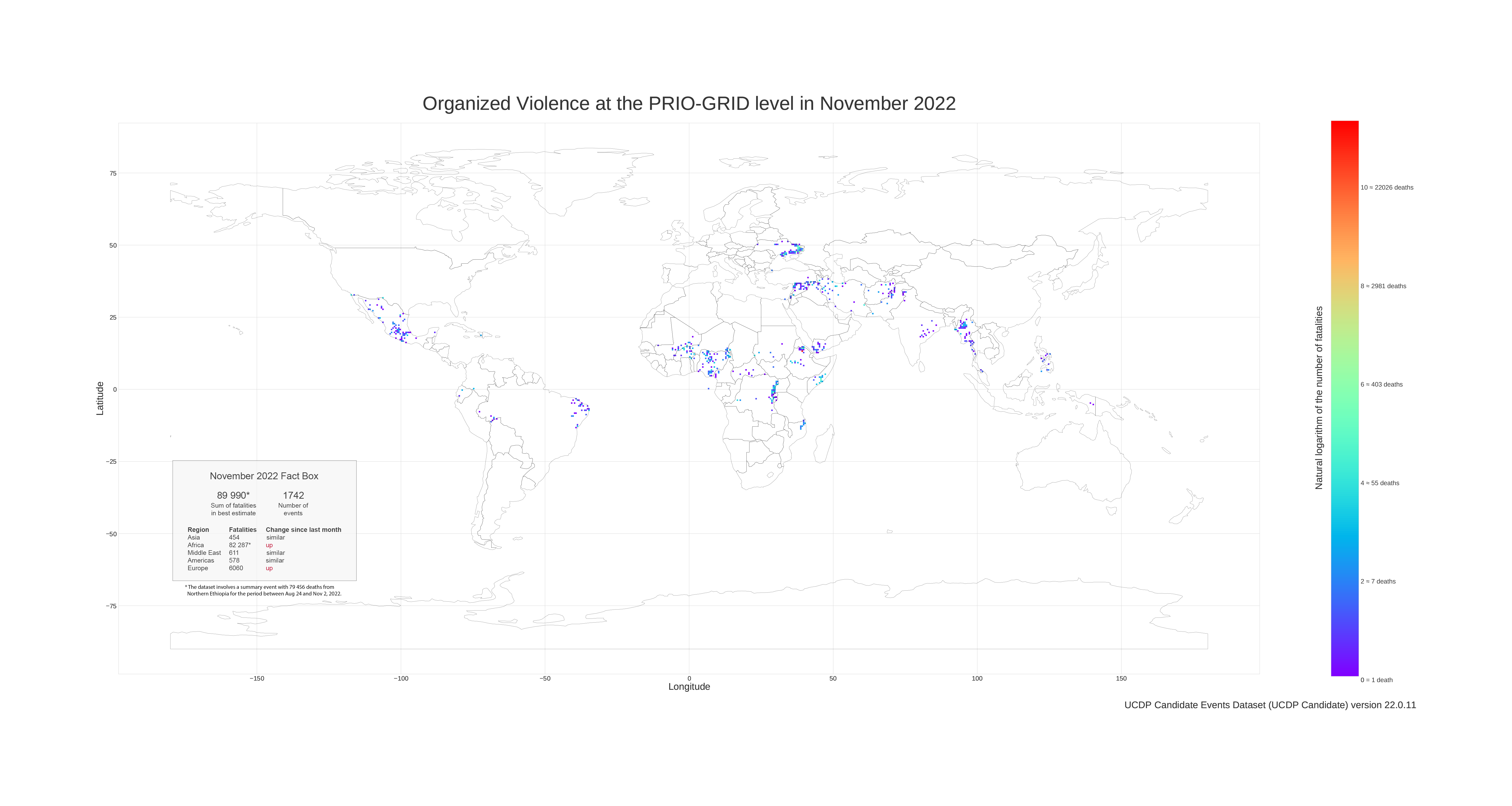|
UCDP Newsletter #10 |
DEADLY PROTESTS IN IRAN |
Organized violence in Iran since the death of Amini |
Director's Note |
|
Welcome to the Uppsala Conflict Data Program (UCDP) Newsletter!
Since mid-September, deadly protests in Iran have been ongoing. Although the killing of Mahsa Amini was the catalyst for the protest movement, the underlying reason for these protests was the rejection of the regime's religious, social and cultural policies. Protesters took to the streets, burnt Ayatollah Khomeini's photos, attacked members of the Revolutionary Guards, and urged the overthrow of the Islamic government in an unequivocal expression of rejection of religious rule, marking the first of its kind since the establishment of the Islamic Republic. Read more about the developments below.
For any questions, suggestions, or comments, you may contact us at ucdp@pcr.uu.se.
Magnus Öberg UCDP Director |
|
Trends in Organized Violence in November 2022 |
|
Mert Can Yilmaz, Uppsala Conflict Data Program |
|
The fighting continued in eastern Ukraine in November 2022, causing at least 5600 fatalities.
Africa dominated the trend in fatalities due to organized violence, while we noted an additional upward trend in Europe when compared to October 2022. In Asia, Middle East and the Americas, the intensity of violence remained at a similar level.
The five deadliest state-based conflicts in November were Ethiopia: Government, Russia - Ukraine, Somalia: Government, Burkina Faso: Government and Myanmar: Government. It should be noted that the UCDP Candidate Events for November 2022 dataset involves a summary event with 79 456 deaths from Northern Ethiopia for the period between August 24 and November 2, 2022.
Conflicts between various unknown non-state groups in Nigeria affected the trends in non-state violence in November 2022, causing at least 100 fatalities. The clashes between Jalisco Cartel New Generation and various other cartels in Mexico caused nearly 160 deaths during the month. Non-state violence in DR Congo was also noteworthy in November 2022.
DR Congo was significantly affected by one-sided violence in November 2022 with over 450 civilians deliberately killed by organized actors. M23 was responsible from over half of the casualties. IS' one-sided attacks in DR Congo, Afghanistan, Mozambique, Mali, Burkina Faso, Syria, Niger and Nigeria caused over 160 fatalities in total during this month. One-sided violence by the Russian forces in Ukraine was also noteworthy, resulting in the death of around 400 civilians. |
|
Source: UCDP Candidate 22.0.11 |
|
Deadly Protests in Iran |
|
Nanar Hawach, Uppsala Conflict Data Program |
|
Following the announcement of the death of 21-year-old Mahsa Amini on September 16, people from all social strata have actively participated in the protests, including a large number of women and students. Despite restricted internet access, the protest movement has been highly broadcasted on social media. Videos of women taking off their hijabs, or young Iranians knocking turbans of clerics’ heads have gone viral, highlighting remarkable developments in the Iranian society under the Islamic Republic. Although Iran has witnessed many waves of protests since the Islamic Revolution in 1979, most of these have been triggered by socio-economic grievances.
The protests also gained support among the Iranian diaspora, including the son of Iran's former king, Reza Pahlavi. In campaigns of endorsement of the protestor’s demands, demonstrations have been organized in countries across the world, such as Germany, Australia and the Unites States. Within the Iranian regime, some leaders of the reformist faction have declared their support for the protesters in the face of the regime's hardline faction, represented by President Ebrahim Raisi.
While the protests have been largely peaceful, the Iranian regime has responded with a harsh crackdown on protestors, similarly to how it has suppressed protests in the past. On the other hand, insurgent groups have attempted to exploit the protests to pass their demands and resort to military action, which served as a justification for the security forces to use excessive violence towards protestors. For instance, insurgent group Jaish al-Adl, claimed responsibility for the attack on a police bus in the city of Zahedan in Sistan and Baluchistan province on September 30, which caused 19 casualties, including civilians, security personnel, and Jaish al-Adl members.
From September 16 to December 7, over 600 fatalities were recorded in Iran in the UCDP Candidate Events dataset, due to one-sided violence towards protesters, as well as clashes between security forces and protesters, and insurgent groups. Over 90 percent of these deaths were civilian casualties in one-sided violence. |
|
The Uppsala Conflict Data Program (UCDP) is the world's main provider of data on organized violence and the oldest ongoing data collection project for civil war, with a history of almost 40 years. Its definition of armed conflict has become the global standard of how conflicts are systematically defined and studied. |
|
UCDP Uppsala Conflict Data Program ucdp.uu.se |


